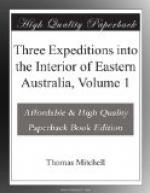Aborigines and colonists.
December 1, 6 A.M.
The thermometer at 82 degrees. As the party proceeded, the sky became overcast, and the absence of the sun made the day much more agreeable. Towards noon we had rain and thunder, and this weather continued until we reached the banks of the Hunter. We forded the river where the stream was considerable at the time, and then encamped on the left bank. The draught animals appeared less fatigued by this journey, than they had been by that of the former day, owing probably to the refreshing moisture and cooler air. After the tents had been pitched, a fine invigorating breeze arose, and the weather cleared up. Segenhoe, the extensive estate of Potter Macqueen, Esquire was not far distant, and Mr. Sempill the agent, called at my tent, and afforded me some aid in completing my arrangements.
I was very anxious to obtain the assistance of an aboriginal guide, but the natives had almost all disappeared from the valley of the Hunter; and those who still linger near their ancient haunts, are sometimes met with, about such large establishments as Segenhoe, where, it may be presumed, they meet with kind treatment. Their reckless gaiety of manner; intelligence respecting the country, expressed in a laughable inversion of slang words; their dexterity, and skill in the use of their weapons; and above all, their few wants, generally ensure them that look of welcome,* without which these rovers of the wild will seldom visit a farm or cattle station. Among those, who have become sufficiently acquainted with us, to be sensible of that happy state of security, enjoyed by all men under the protection of our laws, the conduct is strikingly different from that of the natives who remain in a savage state. The latter are named myalls, by their half-civilised brethren—who, indeed, hold them so much in dread, that it is seldom possible to prevail on anyone to accompany a traveller far into the unexplored parts of the country. At Segenhoe, on a former occasion, I met with a native but recently arrived from the wilds. His terror and suspicion, when required to stand steadily before me, while I drew his portrait, were such, that, notwithstanding the power of disguising fear, so remarkable in the savage race, the stout heart of Cambo was overcome, and beat visibly—the perspiration streamed from his breast, and he was about to sink to the ground, when he at length suddenly darted from my presence; but he speedily returned, bearing in one hand his club, and in the other his boomerang, with which he seemed to acquire just fortitude enough, to be able to stand on his legs, until I finished the sketch (See Plate 1.1.)




